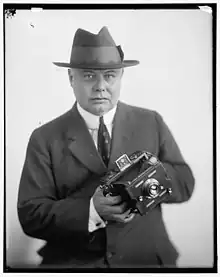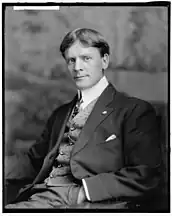Harris & Ewing Inc. was a photographic studio in Washington, D.C. established by George W. Harris and Martha Ewing. As a full service studio, it did portraits and also had a news photo service. Various museums and the Library of Congress have collections of their photographs.
History

As a rookie news photographer, G. W. Harris covered the Johnstown flood of 1889 in Pennsylvania. He worked at Hearst News Service in San Francisco from 1900 to 1903, then joined President Theodore Roosevelt's press entourage on a train trip. Roosevelt,[1] or a San Francisco newspaper editor, angry at having no photograph of George Frisbie Hoar to run with the story of his death,[2] urged him to open a studio in Washington D.C. Harris and Martha Ewing opened their studio in 1905 at 1313 F Street NW. Ewing, an artist and colorist with whom he had worked,[2] financed the company and managed the studio.[3] They replaced the building with a new Harris & Ewing Photographic Studio building in 1924.[4]

By the late 1930s Harris & Ewing was the largest photographic studio in the United States;[3] at its peak, it had five studios, 120 employees, and a news photo service,[2] which, like Underwood & Underwood, employed large numbers of freelance photographers.[3] Although it was particularly known for formal portraits of government figures, it was a full service photographic firm.
The studio became well known in 1908 with The Anatomy of a Smile, a series of candid shots of William Howard Taft receiving the news by telephone of his nomination for the Presidency.[3] Many performers also sat for portraits with the firm. Harris was the primary photographer until 1955, when he retired. He bought out Ewing's share of the company in 1915, but she continued to assist, especially through her social connections. The news service was sold in 1945.[3] Harris died in 1964 at age 92.[5] Harris & Ewing closed in 1977.[2]
Legacy
On his retirement, Harris gave some 700,000 glass and film negatives to the Library of Congress.[3] They are preserved as the Harris & Ewing Collection in the Prints and Photographs Division.[6] Largely taken in and around Washington between 1905 and 1945, the photos portray people, events, and architecture.[5] Many are scanned and online.[5] The City Museum of Washington, D.C. also has a large number of Harris & Ewing photographs, and others are held by the National Portrait Gallery and the Newseum.[2] The Professional Photographers of America named its highest award after Harris.[3][7]
See also
- George Grantham Bain — Bain News Service Collection
References
- ↑ According to the studio's nomination to the National Register of Historic Places: "[T]he president personally urged him to start a photographic news service in Washington because it was so difficult at that time for out-of-town newspapers to get timely photographs of notable people and events in the Nation's Capital." Livingston, Michael (November 13, 2000). "Harris & Ewing studio was photographer to presidents". Washington Business Journal. Retrieved January 11, 2011.
- 1 2 3 4 5 Kelly, John (October 15, 2006). "Answer Man on D.C.'s Photographer to the Stars". The Washington Post.
- 1 2 3 4 5 6 7 Shields, David S. "Harris and Ewing". Broadway Photographs. Retrieved October 18, 2015.
- ↑ "District of Columbia Inventory of Historic Sites". DC Preservation. Archived from the original on June 14, 2011.
- 1 2 3 Livingston, Michael (November 13, 2000). "Harris & Ewing Collection". Library of Congress. Retrieved January 11, 2011.
- ↑ "Harris & Ewing Collection". Library of Congress. Retrieved May 10, 2017.
- ↑ "PPA Award recipients 1951–2011" (PDF) (pdf). Professional Photographers of America. Retrieved October 18, 2015.
External links
 Media related to Harris & Ewing photographs at Wikimedia Commons
Media related to Harris & Ewing photographs at Wikimedia Commons

_circa_1905.png.webp)